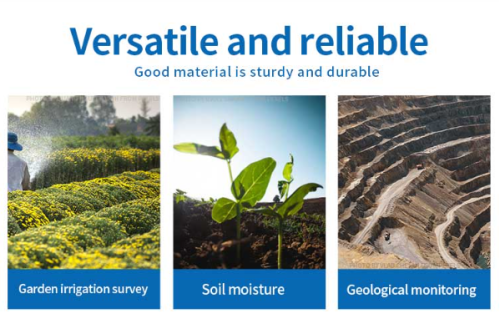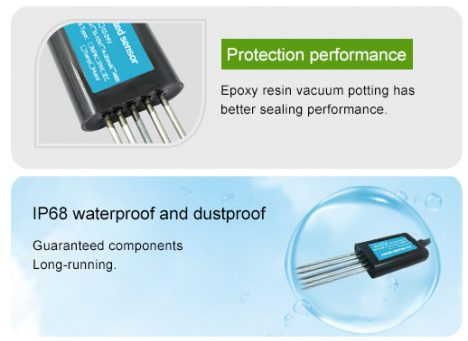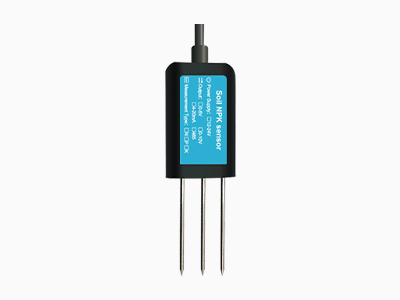In the realm of precision agriculture, the integration of advanced technologies has revolutionized the way farmers monitor and manage soil fertility. Among these technologies, Soil NPK sensor have become a key tool for optimizing nutrient management and improving crop productivity. This article delves into the significance of soil NPK sensors as essential components of precision agriculture, emphasizing their role in improving nutrient utilization, maximizing yields, and contributing to environmental sustainability.
Understanding Soil NPK Sensors
Soil NPK sensor, also known as soil nutrient sensors, are specialized instruments designed to measure the levels of essential nutrients—nitrogen (N), phosphorus (P), and potassium (K)—in the soil. These sensors utilize various technologies to provide real-time, accurate data on nutrient concentrations, enabling farmers and agronomists to make informed decisions regarding fertilizer application, crop management, and soil health assessment.
Functionality and Features of Soil NPK Sensors
- Nutrient Detection Technology: Soil NPK sensors employ a range of detection technologies, including spectroscopy, electrochemical methods, and ion-selective electrodes, to measure nutrient concentrations in the soil. These technologies enable precise and non-destructive analysis of soil nutrients, allowing for continuous monitoring without disturbing the soil structure.
- Multi-Nutrient Analysis: Advanced soil NPK sensors are capable of simultaneously measuring multiple nutrients, including nitrogen, phosphorus, and potassium, as well as other essential elements such as calcium, magnesium, and sulfur. This comprehensive nutrient analysis provides a holistic view of soil fertility, guiding farmers in making balanced fertilizer applications tailored to specific crop needs.
- Data Logging and Connectivity: Many soil NPK sensors are equipped with data logging capabilities, enabling the collection and storage of nutrient data over time. They may also feature wireless connectivity options, allowing users to access real-time data remotely through web-based platforms or mobile applications.
- Integration with Fertilizer Application Systems: Soil NPK sensors can be integrated with precision fertilizer application systems, enabling targeted and variable-rate fertilizer application based on real-time nutrient data. This integration promotes efficient nutrient use and reduces the risk of over-fertilization, leading to improved crop yield and reduced environmental impact.
Applications of Soil NPK Sensors

- Precision Nutrient Management: Soil NPK sensors play a central role in precision agriculture by providing farmers and agronomists with critical information for optimizing fertilizer management. By enabling data-driven decision-making, these sensors contribute to increased agricultural productivity and resource efficiency.
- Environmental Monitoring and Research:Soil NPK sensor in the environmental monitoring program, evaluation of soil nutrient dynamics. They are valuable tools for understanding ecosystem dynamics and informing sustainable land management practices.
- Soil Health Assessment: Soil NPK sensors aid in assessing the overall health and fertility of the soil by providing insights into nutrient availability and balance. This information is essential for implementing soil amendment strategies, improving soil structure, and enhancing the long-term productivity of agricultural land.
- Nutrient Monitoring in Specialty Crops: Soil NPK sensors are particularly valuable in the production of specialty crops, where precise nutrient management is crucial for achieving optimal yields.
Benefits of Soil NPK Sensors in Agriculture

- Enhanced Nutrient Use Efficiency: By providing real-time data on soil nutrient levels, soil NPK sensors enable farmers to efertilizer applications.
- Increased Crop Yield and Quality: Precise nutrient management, guided by data from soil NPK sensors, can lead to improve crop yield, resulting in benefits for farmers .
- Reduced Environmental Impact: The use of soil NPK sensors supports sustainable agricultural practices by minimizing the environmental impact of fertilization,.
Conclusion
Soil NPK sensors are indispensable tools for promoting sustainable agriculture, efficient nutrient management, and environmental conservation. Their ability to provide precise, real-time data on soil nutrient content empowers stakeholders to make informed decisions that optimize nutrient use. As the importance of sustainable land management and nutrient conservation continues to grow. Soil NPK sensors will play a pivotal role in advancing precision agriculture and contributing to a more resilient for agriculture.
